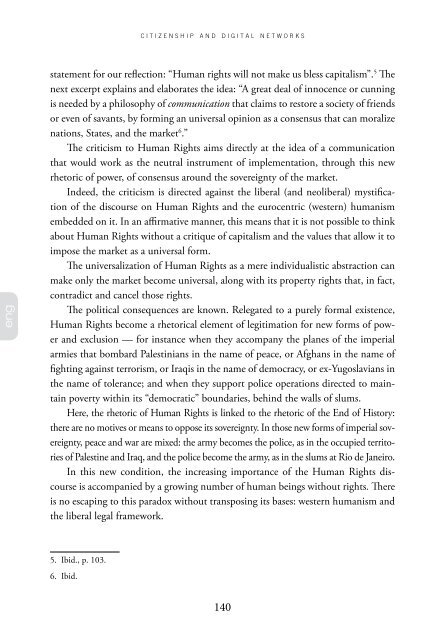Sergio Amadeu da Silveira - Cidadania e Redes Digitais
Sergio Amadeu da Silveira - Cidadania e Redes Digitais
Sergio Amadeu da Silveira - Cidadania e Redes Digitais
Create successful ePaper yourself
Turn your PDF publications into a flip-book with our unique Google optimized e-Paper software.
eng<br />
c i t i z e n s h i p a n d d i g i t a l n e t w o r k s<br />
statement for our reflection: “Human rights will not make us bless capitalism”. 5 The<br />
next excerpt explains and elaborates the idea: “A great deal of innocence or cunning<br />
is needed by a philosophy of communication that claims to restore a society of friends<br />
or even of savants, by forming an universal opinion as a consensus that can moralize<br />
nations, States, and the market 6 .”<br />
The criticism to Human Rights aims directly at the idea of a communication<br />
that would work as the neutral instrument of implementation, through this new<br />
rhetoric of power, of consensus around the sovereignty of the market.<br />
Indeed, the criticism is directed against the liberal (and neoliberal) mystification<br />
of the discourse on Human Rights and the eurocentric (western) humanism<br />
embedded on it. In an affirmative manner, this means that it is not possible to think<br />
about Human Rights without a critique of capitalism and the values that allow it to<br />
impose the market as a universal form.<br />
The universalization of Human Rights as a mere individualistic abstraction can<br />
make only the market become universal, along with its property rights that, in fact,<br />
contradict and cancel those rights.<br />
The political consequences are known. Relegated to a purely formal existence,<br />
Human Rights become a rhetorical element of legitimation for new forms of power<br />
and exclusion — for instance when they accompany the planes of the imperial<br />
armies that bombard Palestinians in the name of peace, or Afghans in the name of<br />
fighting against terrorism, or Iraqis in the name of democracy, or ex-Yugoslavians in<br />
the name of tolerance; and when they support police operations directed to maintain<br />
poverty within its “democratic” boun<strong>da</strong>ries, behind the walls of slums.<br />
Here, the rhetoric of Human Rights is linked to the rhetoric of the End of History:<br />
there are no motives or means to oppose its sovereignty. In those new forms of imperial sovereignty,<br />
peace and war are mixed: the army becomes the police, as in the occupied territories<br />
of Palestine and Iraq, and the police become the army, as in the slums at Rio de Janeiro.<br />
In this new condition, the increasing importance of the Human Rights discourse<br />
is accompanied by a growing number of human beings without rights. There<br />
is no escaping to this paradox without transposing its bases: western humanism and<br />
the liberal legal framework.<br />
5. Ibid., p. 103.<br />
6. Ibid.<br />
140


